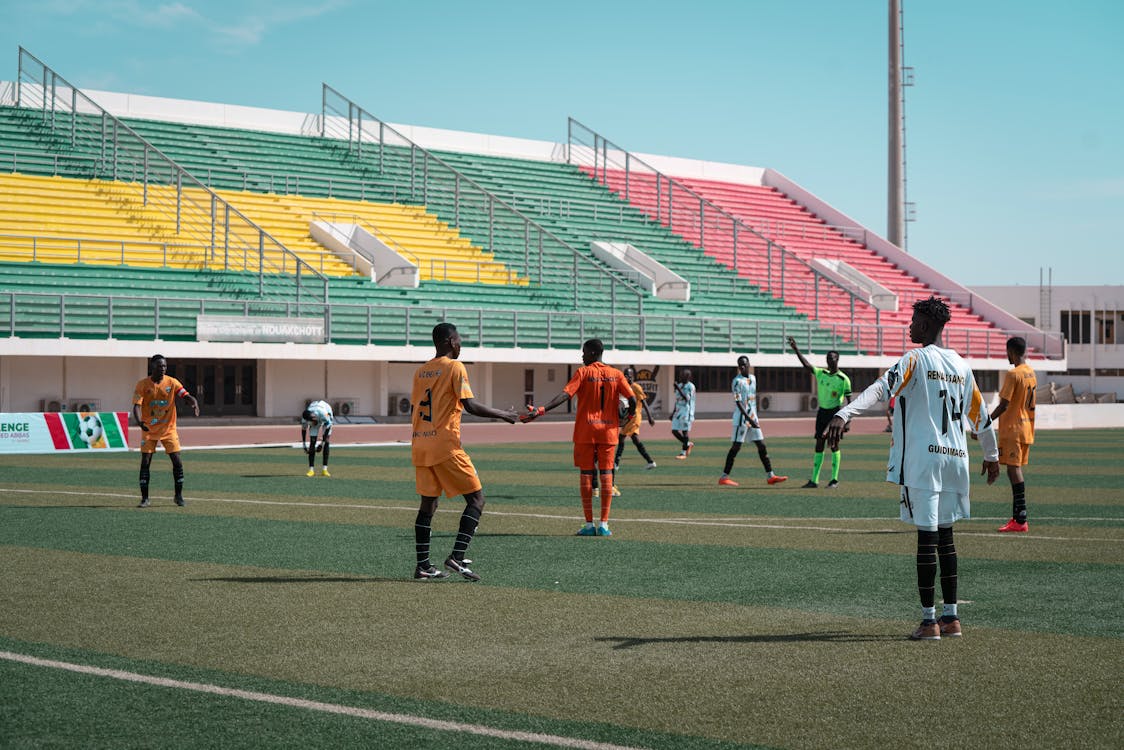
In recent years, the world of sports betting has seen an unprecedented boom, and Angolan football is no exception. From the bustling streets of Luanda to the remote corners of Huambo, betting shops and online platforms have become a common sight, drawing fans and enthusiasts into the thrilling world of sports wagering.
However, this surge in popularity isn’t without its pitfalls. The allure of easy money, combined with the passion for football, has led to a growing concern over addiction, match manipulation, and the integrity of the game. As we dive deeper into the impact of betting on Angolan football, we’ll explore both the highs and the lows, shedding light on a phenomenon that’s reshaping the sport in Angola.
Key Takeaways
Growth of Sports Betting in Angolan Football
In recent years, I’ve observed a significant upsurge in sports betting within Angola, transforming the landscape of not just football but other sports as well. This growth can be largely attributed to the legalization and establishment of a regulated gambling industry, underpinned by comprehensive legislative frameworks. Angola’s approach to sports wagering has been to tightly control it through specific Gambling Laws, ensuring transparency, financial stability, and above all, player protection.
Online platforms and betting shops have sprung up across the country, making it easier for football fans to engage in sports betting. I’ve noticed that companies like eBet Angola play a pivotal role in this burgeoning market. Their operations are a testament to the country’s commitment to regulated gambling, adhering to stringent licensing requirements and regulatory oversight. This has reassured me and countless others about the integrity of sports wagering in Angola, paving the way for a safer and more responsible gambling culture.
Yet, the story doesn’t end at regulation. The rapid growth of sports betting has also brought about a notable impact on Angola’s national economy. Tax revenues from the gambling sector contribute to the fiscal health of the country, creating a symbiosis between economic development and recreational activities. Moreover, the existence of responsible gambling measures ensures that the vibrancy of sports betting does not veer into the territory of adverse social impacts.
The operational framework in Angola, focusing on legislative frameworks, licensing, and regulatory oversight, establishes a clear and fair playing field for all stakeholders. It’s this balance between encouraging sports betting and maintaining a robust regulatory framework that signifies the maturity of Angola’s approach to managing the gambling industry, a model that promises sustainability and growth for both the sector and the nation’s economy. This ongoing evolution in the realm of sports wagering in Angola is more than just about placing bets; it’s about building a financially stable and ethically responsible future.
The Thrilling World of Sports Wagering
As I delve deeper into the world of sports wagering in Angola, it’s impossible not to get excited about the vast opportunities and the sheer dynamism this sector brings to the table. Sports betting in Angola has seen a meteoric rise, thanks in part to the regulated gambling industry that ensures transparency, player protection protocols, and most importantly, fiscal health for the national economy.
eBet Angola stands out as a shining example of how online platforms can thrive within a well-regulated framework. The legality of sports wagering in Angola isn’t just about allowing bets to be placed; it’s about creating a secure environment where players feel confident participating. The Gambling Law in Angola, complemented by rigorous legislative frameworks and licensing requirements, ensures that all players are entering a fair and transparent betting environment.
I’ve noticed that handball, among other sports, has become increasingly popular on platforms like eBet Angola. This diversification speaks volumes about the evolving tastes of bettors in the country and the ability of platforms to cater to a wide array of interests. However, what truly sets the Angolan gambling industry apart is its commitment to responsible gambling measures. The regulatory oversight not only fosters financial stability but also safeguards against the potential downsides of gambling.
The growth of sports wagering in Angola has been phenomenal, supported by an operational framework that champions responsible gambling while harnessing the economic benefits. The regulations established by the Angolan government are pivotal in maintaining a balance that encourages growth while ensuring the wellbeing of the bettors. Through rigorous licensing processes and adherence to licensing requirements, Angola has managed to create a robust system that other countries could look to emulate.
This support structure isn’t just about protecting the players; it’s also instrumental in sustaining the national economy. The taxes and fees generated from sports betting contribute significantly, indicating that the industry isn’t just a form of entertainment, it’s a key economic player.
Concerns Over Addiction and Match Manipulation
While exploring the impact of betting on Angolan football, it’s crucial to address some pressing challenges, notably addiction and match manipulation. These issues aren’t unique to Angola, but given the country’s increasing engagement with sports betting, they warrant special attention.
Firstly, the risk of gambling addiction among punters is a growing concern. Despite the excitement and entertainment value that sports wagering offers, it’s essential to recognize the potential harm. Gamblers can find themselves spending beyond their means, chasing losses, or engaging in compulsive betting behavior. This concern underscores the need for responsible gambling measures and extensive player protection protocols. In Angola, platforms like eBet Angola play a pivotal role, providing resources and tools to promote safe betting practices among its users.
Moreover, the integrity of sports is at risk due to the possibility of match manipulation. The allure of financial gain can tempt players, officials, and others involved in sports to alter the outcome of games, compromising the fairness and unpredictability that form the heart of competitive sports. As such, establishing stringent regulations and implementing rigorous oversight is non-negotiable. The Angolan legislative frameworks, including the Gambling Law, aim to tackle these issues head-on by setting strict licensing requirements and creating an operational framework designed to preserve the transparency and fiscal health of the sports betting industry.
Addressing these concerns is essential not only for maintaining the integrity and appeal of sports wagering but also for ensuring the ongoing contribution of sports betting to the national economy. Through effective regulatory oversight and commitment to responsible gambling, Angola can safeguard itself against the potential downsides of its burgeoning sports betting landscape.
Integrity Issues in Angolan Football
As I delve into the complexities of sports betting in Angola, it’s crucial to shine a spotlight on integrity issues plaguing Angolan football. The surge in sports wagering, facilitated by platforms like eBet Angola, has underscored the need for robust regulatory oversight in the gambling industry. While sports betting is burgeoning, casting a shadow over this growth are concerns around the legality and the potential for match manipulation.
Angola’s response to these challenges has been the implementation of stringent legislative frameworks. The Gambling Law in Angola, complemented by regulations around licensing requirements and player protection protocols, aims to ensure the fiscal health and transparency of the sports wagering ecosystem. Yet, despite these frameworks, the lure of manipulating match outcomes for financial gain continues to be a glaring issue, threatening the very financial stability and integrity of Angolan football.
In the quest for responsible gambling measures, eBet Angola and similar online platforms play a pivotal role. They’re at the forefront of promoting responsible gambling by ensuring compliance with regulatory oversight, thus safeguarding the national economy and the integrity of sports. It’s a tricky balance to maintain – fostering a thriving regulated gambling environment without compromising the spirit and fairness of the game.
The operational frameworks set by Angola’s legislative bodies focus on maintaining rigorous licensing standards and enforcing responsible gambling measures. These efforts are commendable; however, the inherent risks of corruption and manipulation linger. Stakeholders within the gambling industry – from regulatory bodies to online betting platforms – must remain vigilant, continuously updating and enforcing regulations to address these emerging integrity challenges.
Angolan football stands at a crossroads. The actions taken now by all involved, aiming to preserve the game’s integrity while harnessing the positive economic impacts of sports betting, will dictate the path forward. It’s a journey fraught with challenges, but with effective regulatory oversight and a commitment to responsible gambling, it’s one that can lead to a future where the sport and the betting industry coexist harmoniously, fostering growth and safeguarding the essence of competition.
Reshaping the Sport: The Impact of Betting in Angola
With the legal frameworks around sports wagering evolving, Angola is at the forefront, adapting to changes with an aim to benefit its national sports scene, particularly football. The stakes have grown, not just for the players on the pitch but also for the fans betting on the outcomes. The legalization and regulation of sports betting, underpinned by Angola’s Gambling Law, have been pivotal in sculpting a new era for sports enthusiasts and the economy at large.
In my experience, the introduction of regulated gambling and platforms like eBet Angola has significantly altered the landscape. These online platforms are not just changing the way fans engage with the sport but also bringing about a positive impact on the financial stability and fiscal health of the footballing world in Angola. By ensuring responsible gambling measures, regulatory oversight, and strict licensing requirements, Angola is setting a benchmark in ensuring that sports betting contributes positively to the sport and its economy.
However, it’s not without its challenges. The gambling industry, especially in a football-mad country like Angola, necessitates constant vigilance to prevent issues such as match-fixing and ensure the maintenance of sports integrity. The concern for player protection protocols is paramount, ensuring that the excitement of the game and the lure of betting do not compromise the well-being of the players.
The economic implications are notable too. With regulated and legal sports betting, there’s an opportunity for Angola to harness a part of the burgeoning gambling industry to boost the national economy. It’s not just about the revenues from licensing and taxes; it’s also about creating a sustainable operational framework that supports responsible gambling while maximizing economic benefits.
For a passionate football follower like myself, seeing the transformation in Angola’s football scene has been fascinating. The emergence of legal sports wagering under a robust legislative framework promises to protect the interests of all stakeholders – from the players on the field to the fans placing bets, and the national economy as a whole. The ongoing commitment to transparency, regulatory oversight, and responsible gambling is crucial as we navigate this changing landscape.
Conclusion
Angola’s journey in integrating sports betting into its football scene shows a promising path toward economic and sporting growth. The key to maximizing these benefits lies in striking a balance between leveraging economic gains and addressing challenges head-on. As I’ve delved into the nuances of Angola’s approach, it’s clear that with the right regulatory frameworks and a commitment to responsible gambling, the nation stands to enhance not just its football but its broader economy. The road ahead is paved with opportunities and hurdles alike but with continued focus on transparency and player protection, Angola’s football can thrive in this new era.







